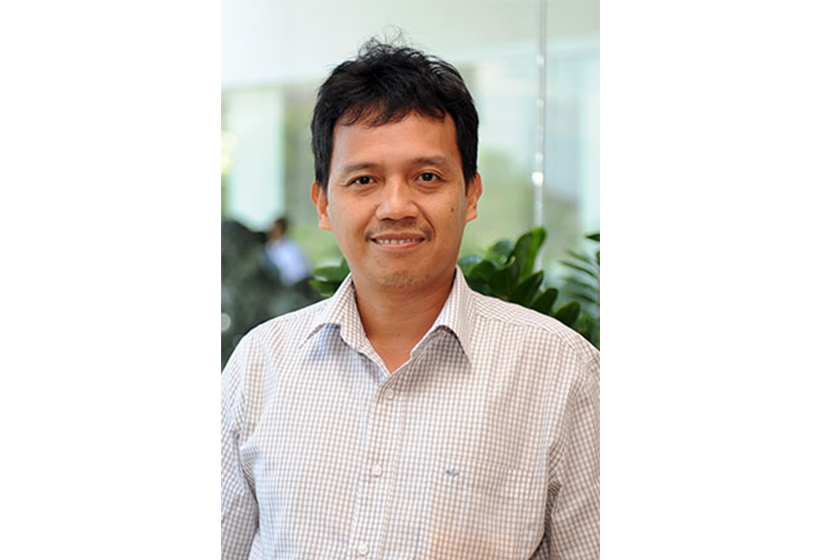Asrul Sani, lecturer at the Faculty of Mathematics and Natural Sciences, Universitas Halu Oleo, Kendari, Southeast Sulawesi, has been teaching for 23 years. “Having graduated from Teacher’s College, I was at first a lecturer for students who were aiming to become high school Mathematics teachers, but then I fell in love with Applied Mathematics,” Asrul smiled.
This particular turn in Asrul’s teaching career came about during his graduate studies in Canada. He left in 1997 and by the end of his studies, he was researching Applied Mathematics in medicine. “I researched the blood clotting system and had the opportunity to visit New York Mount Sinai Hospital to support the research. I came to realize just how far reaching the impact of Applied Mathematics is,” Asrul explained.
When Asrul returned to Indonesia, he brought his newfound enthusiasm for the subject and passed it on to his students. Asrul added, “I wanted to show them that Mathematics is far from being a theoretical isolated subject, but rather, is a tool that communicates and serves as a bridge to aid all the other subjects, be it medicine, biodiversity, even politics.”
Asrul has since worked on applying Mathematics to predict dengue fever hotspots to ensure effective epidemic prevention and has set mathematical equations to estimate the total population of anoa, the near extinct goat-sized cow, an icon of Southeast Sulawesi. As for its application in politics, it was far from the typical application of Mathematics often associated with election and vote-count management.
“A regent had written a book and applied a mathematical model to explain his theory of socialism and communism as a new philosophy he has dubbed as surgaism,” Asrul explained. He was part of a team of Applied Mathematics experts who were asked to review the book.
These varied real-life applications of Applied Mathematics drove Asrul to look for scholarships to pursue his PhD. “I did all I could to look for scholarships to support my studies,” Asrul reminisced. Reliable internet connection was still scarce in Kendari at that time, so every time he had business to conduct in Jakarta, Asrul made sure to visit all the embassies for information on available scholarships.
“I studied each rejected application to see what I could improve on. The second time I applied for the Australia Awards Scholarships, I was shortlisted for an interview, and when I was later unsuccessful, I asked inputs from others as to how I could improve the outcome.”
“It took me four attempts before I was granted an Australia Awards Scholarship in 2004,” Asrul admitted. His reflective processes, preparation and sheer persistence had paid off however. Asrul went on to graduate with a PhD in Applied Mathematics from the University of Queensland in 2008. At the time he was one of two PhD candidates from Indonesia in a class of approximately 20 candidates.
With newly gained knowledge on the various applications of Applied Mathematics, Asrul made the transition from the Faculty of Education to become lecturer at the Faculty of Mathematics and Natural Sciences, teaching students on how to apply Mathematics in their careers.
Additionally, Asrul helps high school teachers at several international standardized schools in Kendari prepare themselves to teach Mathematics in English and bilingual settings. When Asrul was still in Australia, he had the opportunity to tutor international students in Mathematics. Asrul’s unique qualification as an expert in Mathematics and his experience abroad enables him to help high school teachers at the international standardized schools conduct Mathematics lessons in English. Asrul also taught the teachers specific sets of mathematical terminologies that aren’t universal from one language to another, unlike Latin in Biology.
Asrul was also involved in the Mathematics expo for two consecutive years in Australia, explaining the appeal and real-life application of Mathematics to students and their parents. Back in Indonesia, Asrul continues to be involved with the international community as Secretary of the Global Collaboration Agency of Universitas Halu Oleo.
Asrul’s Australia Awards experience has further fostered his love for Applied Mathematics, and he enjoys passing the passion on to his students. Out of all the real-life application of Applied Mathematics Asrul has been involved in, ecology and epidemics stood out the most for him.
“Indonesia is such a large and diverse country. We need to preserve all the rich bio-diversity from extinction. We are also prone to epidemics of infectious diseases. I really want to conduct Applied Mathematics research in ecology and epidemics—to prevent extinction of Indonesia’s various natural resources and to help aid optimise prevention of epidemics, respectively,” Asrul enthused.
Asrul is certainly well on his way to achieve his goal with the anoa research and dengue fever hotspot research.


 Applied Mathematics, a Real-life Application to Aid Other Subjects
Applied Mathematics, a Real-life Application to Aid Other Subjects
